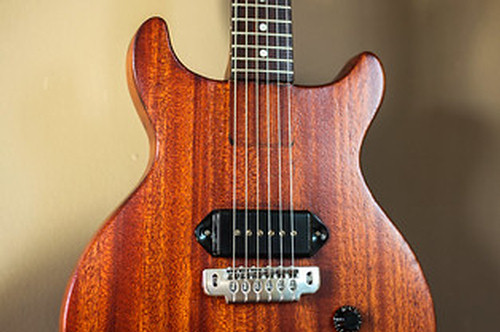Although they were first used on Gibson guitars, the manufacturer shifted to using more humbucker-style pickups as it developed later models, and many of the best guitars that use P-90 style pickups on the market today are made by newer brands who emulated this iconic pickup design.
Whatever your budget, if you’re looking for a new guitar that gives you both edge and precision, one of these models that uses P-90 pickups will let you find your ideal sound.
These are, without a doubt, the best P90 guitars on the market:
P90 Guitar 1: Godin 5th Avenue Kingpin II
This retro-styled archtop electric updates the vintage design, with a rounded cutaway that harkens back to its acoustic roots and a body of laminated wild cherry. The precision of the craftsmanship is unparalleled, with a slightly higher neck than most guitars that gives it a relatively high action. Tone-wise, it has a lot of character, handling both clean tones and grit beautifully, with a rounder attack than many P-90 guitars.
The hollow body (see full specs) does limit its dynamic range slightly, but if you’re in the jazz, blues, or folk styles, the smooth, creamy tone more than makes up for it. It comes installed with two Godin P-90 pickups—vintage styled, of course, to complete the aesthetic charm of this unique and beautiful instrument. This should be on anyone’s list of the best P90 guitars.
P90 Guitar 2: Guild M-75 Aristocrat Hollow Body
Guild is one modern brand taking full advantage of the P-90 pickup design. They have a few different models that are built for P-90s, but our favorite has to be the M-75 Aristocrat. Like other options on this list, it uses a semi-hollowbody construction that gives the tone a delightful blend of acoustic depth with an electric guitar’s output and distortion. The proprietary SB-1F pickups on the bridge and neck have a vintage-inspired tone that’s well-suited to this construction.
The Guild M-75 is designed for serious guitarists, especially those in the jazz and folk genres. While the look and feel of it are based on guitars from the 1950s, the hardware is as modern and well-designed as the pickups, including a floating Tune-O-Matic bridge. Our only complaint against this guitar is that it’s definitely on the heavy side at 18 pounds, especially for a semi-hollowbody instrument. Aside from this minor quibble, it’s an easy-playing and soulful instrument built for the discerning professional.
P90 Guitar 3: Epiphone Casino
Epiphone has a reputation for delivering professional hand-craftsmanship at affordable prices, and they uphold this reputation with their Casino model. Like the other guitars on this list, the Epiphone Casino draws its inspiration from decades past—in this case from the model the company released in the 1960s, which was made popular when several of the Beatles purchased and played them.
The re-issue of this hollow-body electric (see full specs) has a maple body with a mahogany neck and rosewood fingerboard. Added to these traditional tone woods are more modern upgrades, like the Tune-O-Matich bridge and the two installed Alnico V pickups that are a modern re-make of those that came on the original.
P90 Guitar 4: Yamaha RevStar RS502T
Yamaha is known for precision more than artistry, but there are some unique and interesting offerings in their product line that defy this stereotype. The RevStar is one of these. It uses the same smart engineering and careful craftsmanship Yamaha is known for, but also brings a lot more personality to the table than most people expect from the brand.
The body on the RevStar was re-designed for maximum comfort, with a neck joint that gives you easy access to the upper frets and contours shaped to your forearms. The hardware is all-custom, with a simplified look inspired by vintage motorbikes. The floating aluminum tailpiece is the most unique feature on the RS502T, but the custom-wound YGD pickups are worth talking about, too, designed to bring out the best of your instrument. Hands down, it’s one of the best P90 guitars for the money.
P90 Guitar 5: The Loar LH-302T-CCB
P-90 pickups are a popular choice for hollowbody guitars, bringing out their unique tone and resonance. The dogear-style pickups on this The Loar model emphasize its lively response, giving the tone a raunchy blues grit when you push the gain. The maple used in the body’s construction imparts a crisp brightness to the clean tone, perfect for jazz soloists or any player who needs clear definition on quick lines.
The scroll-F soundholes and single-cutaway design give the guitar an attractive vintage-inspired look, but the body isn’t just designed for aesthetics. It’s a smooth-playing instrument with good action and a comfortable C-shaped neck that really lets your fingers fly over the frets. All-told, it’s a versatile guitar that looks as beautiful as it sounds.
P90 Guitars: Body Materials and Construction
In the minds of most people, acoustic guitars are hollow and electric guitars are solid. While this is often the case, in reality things are not quite that cut and dry. There are three broad categories of construction when it comes to electric guitars: Solid-body, semi-hollow body, and hollow-body. These terms are fairly self-explanatory, though the effect of this construction on the sound is more complicated.
The wood used in the construction of a hollow-body guitar will have significantly more impact on the final tone than that of a solid-body guitar—the space within the body allows the wood of a hollow-bodied instrument to vibrate more, giving more warmth and depth to the tone. A solid-body guitar will get a larger percentage of its tone color from the pickups and hardware, and is less susceptible to feedback at high gain. A semi-hollow body strikes a balance between these two extremes. If you want resonance from the guitar’s tonewoods but don’t want to worry about squeals and squeaks when you get loud, a semi-hollow body could be the answer.
While tonewoods won’t impact the sound of a solid-body guitar as much, it’s still something you should think about as you’re comparing models. Even with a solid-body, the density of the wood affects how the instrument resonates—and with a hollow-body design, this is even more important.
Mahogany is a popular wood to pair with P-90s. The dark, warm tone of mahogany benefits from the articulation and brilliance of single-coil pickups. Maple is another popular choice for electric guitars, sweetening and deepening your tone without losing any clarity. Spruce is the densest and brightest of the tonewoods commonly used in electric guitars. It’s often used in conjunction with maple or mahogany to prevent the tone from becoming too dark and muddy.
When buying the best P90 guitar, you’d also need to consider the shape of the guitar. With a solid-body, comfort will be the primary concern when it comes to shape. For hollowbody guitars, though, changing the shape alters the size and shape of the interior cavity, which will impact the sound. This doesn’t mean you have to sacrifice playing comfort for the sake of resonance, however. The single-cutaway design on the Guild M-75 or The Loar 302T gives you the same high fret access as familiar solid-body electrics, like the Les Paul. Keep both sound and feel in mind when you’re deciding which model is best for you.










The Gibson or Epiphone Blueshawk is one of the best sounding new designs that takes full advantage of the P-90, combining it with a high tech 6 position filtering switch that greatly increases the range tones you are able to get. In addition it has third P-90 coil installed in the back of the guitar between the bridge and neck pickups which provides hum canceling. So… The Blueshawk has much lower noise than most P-90 guitars. I have compared it to my Les Paul Special double cut, Les Paul TV and my 61 SG reissue. All using P-90s, the Blueshawk generates much less noise than all of them but gets the P-90 sound you want plus more..
🙂 you should try a Blueshawk before they are all gone…..
I have both the Gibson BluesHawk and Epiphone Blueshawk. the Epiphone is favorite with its more powerful P-90s than the Gibson..
The only one even marginally interesting is the Revstar.
The most superior P-90 Guitar out currently is the Epiphone Blueshawk. It is the most versatile and works with any style of music…